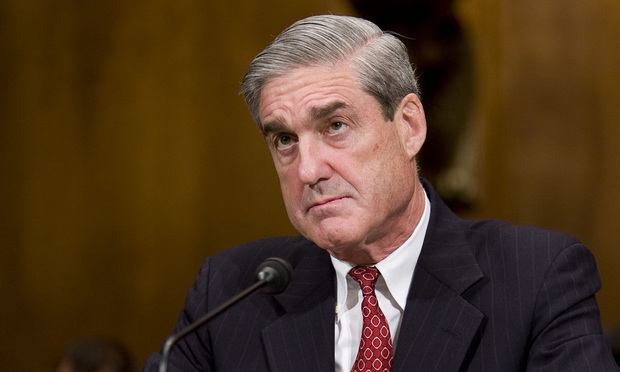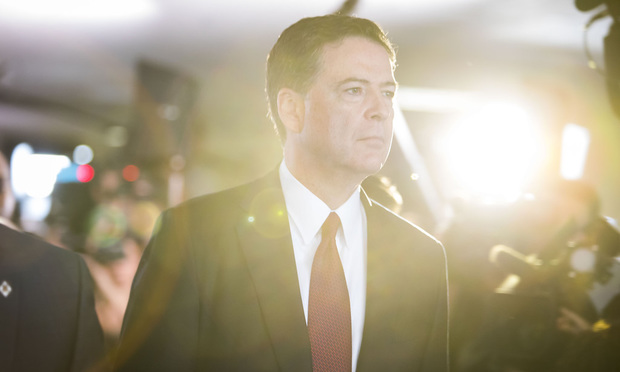The Big Questions, and Curbed Expectations, Lawyers Have for Robert Mueller
Stuart Gerson, Neal Katyal, James Comey and many others are writing about the things they want Mueller to be asked—and answered—at Wednesday's hearings. Here's a snapshot.
July 23, 2019 at 01:17 PM
7 minute read
 Robert Mueller. Photo: Diego M. Radzinschi/ALM
Robert Mueller. Photo: Diego M. Radzinschi/ALM
Robert Mueller's testimony Wednesday on Capitol Hill is sure to capture the nation. Mueller has said very little publicly about his two-year assignment investigating President Donald Trump and how Russia worked to benefit his 2016 presidential campaign. Now, he's in the klieg lights.
Still, Mueller is a reluctant witness, appearing not because he wants to—he said in May his 448-page report “speaks for itself”—but because House Democrats want to press him about how he arrived at certain conclusions, and what more he might want to say about Trump and his campaign's ties to Russia.
Trump has declared Mueller's report a “total exoneration,” and Democrats almost certainly will try to counter that assertion. Mueller didn't say whether he thinks Trump tried to obstruct the investigation, but the report also explicitly did not exonerate the president. Whether and how Mueller veers from his report—the expectation is that he will not—is consuming the echo chamber. “The report is my testimony,” Mueller said in May. “I would not provide information beyond that which is already public in any appearance before Congress.”
U.S. Justice Department leaders have warned Mueller to “remain within the boundaries of your public report because matters within the scope of your investigation were covered by executive privilege.” Mueller is expected to face questions about his engagement with U.S. Attorney General William Barr, who said the evidence gathered by the special counsel's team did not amount to obstruction of justice.
Here's a snapshot of some of the questions, and expectations, lawyers have about Wednesday's Mueller hearings in front of the House judiciary and intelligence committees.
>> Stuart Gerson of Epstein Becker Green and former Justice Department official: “More than 1,000 former federal prosecutors—that is, men and women who, unlike Barr, have actually tried and convicted federal criminal defendants—have publicly stated that the quality and quantity of the evidence of obstruction would have been legally sufficient to support an indictment. What does Mueller think? He has been an assistant United States attorney who has prosecuted serious crimes. He has been a distinguished director of the FBI. Did he and his staff conclude that if the person under investigation were someone other than the president, an indictment would have been in order?” [The Atlantic]
>> Neal Katyal, Hogan Lovells partner and former Obama-era acting U.S. solicitor general, presented three “simple yes-or-no questions” to Mueller, banking off Trump's disputed declaration that the report was a “total exoneration.” Katyal wrote: “First, did your report find there was no collusion? Second, did your report find there was no obstruction? Third, did your report give the president complete and total exoneration?” Katyal tacked on two more questions that explore the relationship between Barr and Mueller: “Did Mr. Barr ever tell you that you could reach a decision about Mr. Trump's criminality? Second, since Mr. Barr has now said that department policy allows you to reach a decision as to whether it was criminal activity, please do so.” [New York Times]
 Former FBI Director James Comey testifies about his firing by President Donald Trump during a Senate Intelligence Committee hearing June 8, 2017. Credit: Diego M. Radzinschi/ALM
Former FBI Director James Comey testifies about his firing by President Donald Trump during a Senate Intelligence Committee hearing June 8, 2017. Credit: Diego M. Radzinschi/ALM>> James Comey, former FBI director, presented more than a dozen questions that he said he would ask if he had five minutes of air time with Mueller. Like Katyal's questions, Comey presented interrogatories that can be answered with a yes or no. For instance: “Did you find substantial evidence that the president had committed obstruction of justice crimes?” And: “Did you find that the president wanted the White House counsel to write a false memo saying he had not been ordered to have the special counsel removed?” [Lawfare]
>> Donald Ayer, retired Jones Day partner and former Justice Department lawyer: “What about Mueller's stated reason, based on notions of fair play, for declining even to express a judgment about probable criminality by the president? There—and only there—Barr seems to have it right. A speculative opinion of the Office of Legal Counsel foreclosing indictment of the president, based on no explicit constitutional or statutory language, should not be expanded so as to prevent a special counsel from doing his job. Mueller should accept Barr's interpretation on this issue of departmental guidance, and give us the benefit of his professional judgment on the legal significance of the facts he has found.” [The Atlantic]
>> Joshua Geltzer, executive director of the Institute for Constitutional Advocacy and Protection at Georgetown University Law Center; Ryan Goodman, New York University School of Law professor; and Asha Rangappa, senior lecturer at Yale's Jackson Institute for Global Affairs: Geltzer, Goodman and Rangappa present 46 questions (including from readers) that Congress should ask Mueller. Some of the questions included: “What is Congress' constitutional basis for investigating obstruction of justice by the president, and how would such an investigation be consistent with the separation of powers?” And: “If Congress wanted to determine for itself the strength of the case of obstruction or abuse of power, not necessarily according to criminal law standards of proof, who would be the most important potential witnesses for the public to hear from and for Congress to call on to testify?” [Just Security]
>> Michael Dorf, professor at Cornell Law School: “Tomorrow's scheduled appearance of Robert Mueller before Congress will be covered breathlessly by the media but will likely be unenlightening and unimportant. I base that assessment on the following: (1) Mueller has already made clear that he does not intend to say anything that's not in his report; (2) that rules out an answer to the one question to which his answer could possibly move the needle on public opinion—whether, absent the DOJ policy he followed barring indictment of a sitting president, Mueller would have concluded there was sufficient evidence to charge Trump with obstruction of justice.” [Dorf on Law]
>> Andrew Napolitano, former New Jersey state judge: “It's hard to believe that Bob Mueller would tell us something new. We have the 444-page report, which is like a prior statement. We have his 10-minute statement, which surprised everybody, that he made in the Justice Department before he resigned. Now we're going to have his introductory statement. The more statements you make the more opportunities those who are cross-examine you have to see if there are inconsistencies between what you said before and what you say now.” [Fox News]
Read more:
'Multiple Felony Charges': Ex-Federal Prosecutors Call Out Trump's Conduct
'Stormy Weather Lies Ahead': What Lawyers Said About Barr's Obstruction Call
Conservative Big Law Veterans Raise Specter of Trump Impeachment
Read the Letter: Mueller Complains Barr Caused 'Public Confusion'
Mueller's Restraint, Barr's Press Conference: Here's What Lawyers Are Saying
This content has been archived. It is available through our partners, LexisNexis® and Bloomberg Law.
To view this content, please continue to their sites.
Not a Lexis Subscriber?
Subscribe Now
Not a Bloomberg Law Subscriber?
Subscribe Now
NOT FOR REPRINT
© 2025 ALM Global, LLC, All Rights Reserved. Request academic re-use from www.copyright.com. All other uses, submit a request to [email protected]. For more information visit Asset & Logo Licensing.
You Might Like
View All
Trump's DOJ Delays Releasing Jan. 6 FBI Agents List Under Consent Order
3 minute read
Judge Grills DOJ on Trump’s Birthright Citizenship Executive Order

Perkins Coie Backs Challenge to Trump's Ban on Transgender Military Service
4 minute read
Selendy Gay Files Lawsuit Challenging Trump's Workforce Reclassification EO
2 minute readTrending Stories
- 1ACC CLO Survey Waves Warning Flags for Boards
- 2States Accuse Trump of Thwarting Court's Funding Restoration Order
- 3Microsoft Becomes Latest Tech Company to Face Claims of Stealing Marketing Commissions From Influencers
- 4Coral Gables Attorney Busted for Stalking Lawyer
- 5Trump's DOJ Delays Releasing Jan. 6 FBI Agents List Under Consent Order
Who Got The Work
J. Brugh Lower of Gibbons has entered an appearance for industrial equipment supplier Devco Corporation in a pending trademark infringement lawsuit. The suit, accusing the defendant of selling knock-off Graco products, was filed Dec. 18 in New Jersey District Court by Rivkin Radler on behalf of Graco Inc. and Graco Minnesota. The case, assigned to U.S. District Judge Zahid N. Quraishi, is 3:24-cv-11294, Graco Inc. et al v. Devco Corporation.
Who Got The Work
Rebecca Maller-Stein and Kent A. Yalowitz of Arnold & Porter Kaye Scholer have entered their appearances for Hanaco Venture Capital and its executives, Lior Prosor and David Frankel, in a pending securities lawsuit. The action, filed on Dec. 24 in New York Southern District Court by Zell, Aron & Co. on behalf of Goldeneye Advisors, accuses the defendants of negligently and fraudulently managing the plaintiff's $1 million investment. The case, assigned to U.S. District Judge Vernon S. Broderick, is 1:24-cv-09918, Goldeneye Advisors, LLC v. Hanaco Venture Capital, Ltd. et al.
Who Got The Work
Attorneys from A&O Shearman has stepped in as defense counsel for Toronto-Dominion Bank and other defendants in a pending securities class action. The suit, filed Dec. 11 in New York Southern District Court by Bleichmar Fonti & Auld, accuses the defendants of concealing the bank's 'pervasive' deficiencies in regards to its compliance with the Bank Secrecy Act and the quality of its anti-money laundering controls. The case, assigned to U.S. District Judge Arun Subramanian, is 1:24-cv-09445, Gonzalez v. The Toronto-Dominion Bank et al.
Who Got The Work
Crown Castle International, a Pennsylvania company providing shared communications infrastructure, has turned to Luke D. Wolf of Gordon Rees Scully Mansukhani to fend off a pending breach-of-contract lawsuit. The court action, filed Nov. 25 in Michigan Eastern District Court by Hooper Hathaway PC on behalf of The Town Residences LLC, accuses Crown Castle of failing to transfer approximately $30,000 in utility payments from T-Mobile in breach of a roof-top lease and assignment agreement. The case, assigned to U.S. District Judge Susan K. Declercq, is 2:24-cv-13131, The Town Residences LLC v. T-Mobile US, Inc. et al.
Who Got The Work
Wilfred P. Coronato and Daniel M. Schwartz of McCarter & English have stepped in as defense counsel to Electrolux Home Products Inc. in a pending product liability lawsuit. The court action, filed Nov. 26 in New York Eastern District Court by Poulos Lopiccolo PC and Nagel Rice LLP on behalf of David Stern, alleges that the defendant's refrigerators’ drawers and shelving repeatedly break and fall apart within months after purchase. The case, assigned to U.S. District Judge Joan M. Azrack, is 2:24-cv-08204, Stern v. Electrolux Home Products, Inc.
Featured Firms
Law Offices of Gary Martin Hays & Associates, P.C.
(470) 294-1674
Law Offices of Mark E. Salomone
(857) 444-6468
Smith & Hassler
(713) 739-1250








